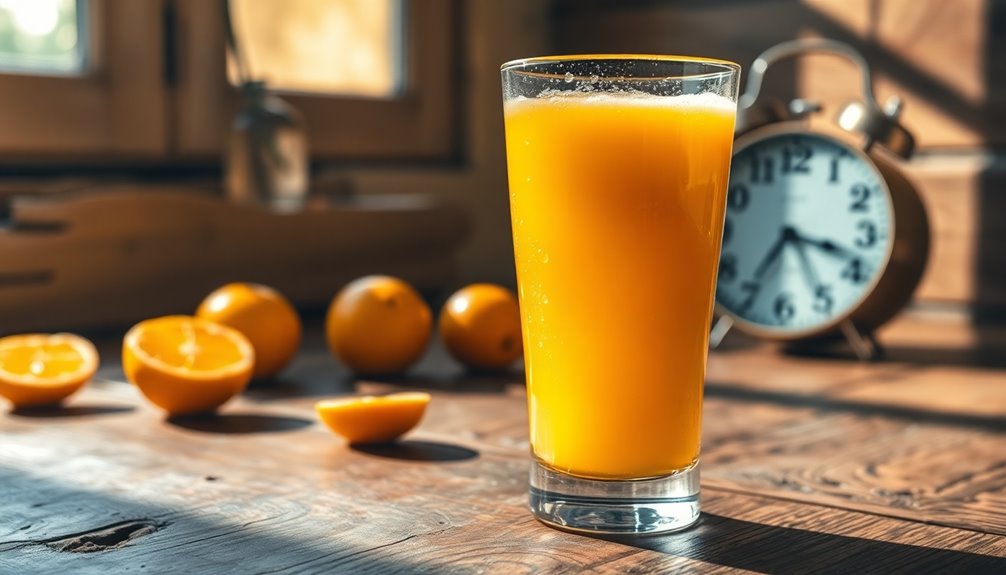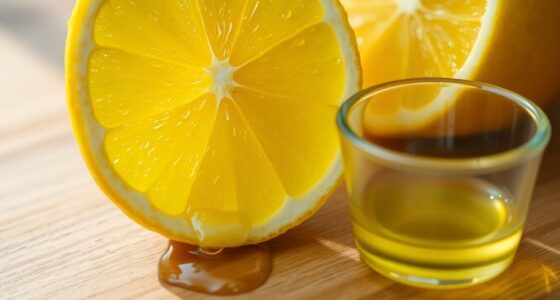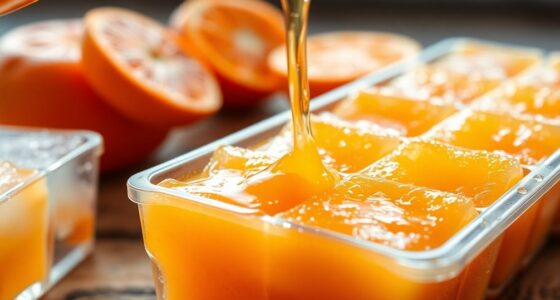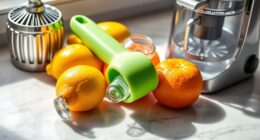Fresh juice typically lasts between 24 to 72 hours when stored properly. For the best taste and nutrient content, you'll want to consume it within the first 24 hours. If you're using a cold-pressed juicer, your juice may stay fresh for about 4 to 5 days. Proper storage in airtight glass containers minimizes oxidation and preserves flavor. Curious about other storage tips and how to enhance your juice experience? There's more to explore!
Key Takeaways
- Fresh juice typically lasts between 24 to 72 hours when stored properly, with optimal taste within the first 24 hours.
- Cold-pressed juice can remain fresh for about 4 to 5 days, while centrifugal juice lasts around 24 hours.
- Proper storage in airtight glass containers minimizes oxidation, preserving flavor and nutrients.
- Fresh juice can be frozen for up to 6 months, but best consumed within 2 to 3 months for optimal taste.
- The shelf life of raw juices varies from 3 to 7 days, depending on handling and storage methods.
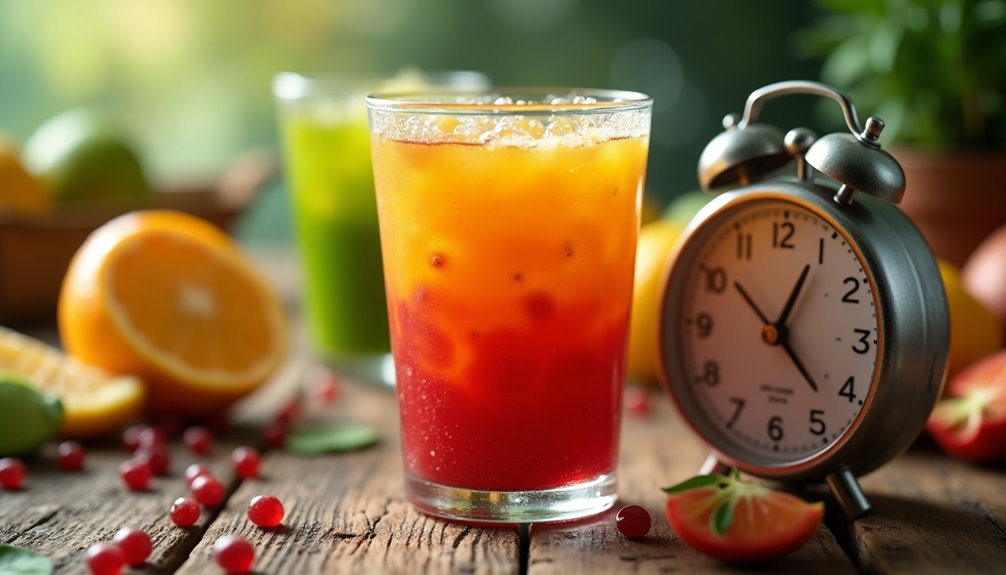
Have you ever wondered how long your fresh juice will stay good in the fridge? It's a common question for anyone who loves drinking juice, and the answer can vary quite a bit depending on how you store it. Generally, fresh juice lasts between 24 to 72 hours when stored properly, with the best taste and nutrient content found within the first 24 hours. If you're looking to enjoy that fresh flavor and nutritional punch, it's best to drink it soon after you've made it.
The type of juicer you use also plays a significant role in determining your juice's shelf life. For instance, if you've got a twin-gear juicer, you can expect your cold-pressed juice to last about 4 to 5 days. On the other hand, if you're using a centrifugal juicer, your juice will only remain fresh for about 24 hours. This difference is primarily due to how each juicer processes fruits and vegetables, with twin-gear juicers being gentler and causing less oxidation.
Storing your fresh juice correctly is crucial for maintaining its quality. To store fresh juice effectively, always use airtight containers. Glass containers work best since they limit the exposure to oxygen and light, both of which can degrade the juice's nutrient content. When juice is exposed to air, it undergoes an oxidation process that can lead to a loss of flavor and nutrients. So, keeping that juice tightly sealed not only preserves its taste but also helps retain those valuable vitamins and minerals.
If you find yourself with more fresh juice than you can drink, freezing juice is a fantastic way to extend its shelf life. You can freeze fresh juice for up to 6 months, but for the best taste and nutrient retention, it's advisable to consume it within 2 to 3 months. Just be sure to leave some space in your container for expansion as it freezes. Thawing your juice in the fridge before consuming is a great approach, as it helps maintain the best texture and flavor.
Another factor to consider is the type of juice you’re making. Raw juices may have a shelf life of 3 to 7 days, depending on how they’ve been handled and stored. This variability emphasizes the importance of proper handling right from the juicing process to storage. Additionally, incorporating exotic fruit blends can enhance both the flavor and nutrient content of your fresh juice, making it even more enjoyable. It’s also essential to keep in mind the environmental conditions in which the juice is stored, as temperature can significantly impact its freshness. Many people often wonder, “how long does juice head last? ” Understanding the various factors that influence juice longevity can help you make informed choices about the best practices for storage. Ultimately, enjoying your juice at its peak freshness not only maximizes taste but also ensures you’re getting the most nutritional benefits.
Always remember that the fresher the juice, the more nutrients it retains, so it pays off to enjoy your creations sooner rather than later.
Frequently Asked Questions
How Long Can You Store Juice After Juicing?
After juicing, you can store your juice for about 24 to 72 hours in the fridge if you keep it in an airtight glass container.
To enjoy the best taste and nutrition, it's ideal to drink it within the first day.
If you want to extend its shelf life, freezing your juice allows you to store it for up to six months without losing much of its nutrients.
Always consider storage conditions!
How Long Can Freshly Squeezed Juice Last in a Mason Jar?
If you store freshly squeezed juice in a mason jar, it can last between 24 to 72 hours in the fridge when sealed properly.
To maximize freshness, fill the jar to the brim to reduce air exposure. If you vacuum-seal it, you could extend its life to 5-7 days.
For longer storage, freezing can keep your juice good for up to 6 months, though consuming it within 2-3 months is best for taste.
Can You Drink Juice After 7 Days?
You might think that juice can still be safe to drink after 7 days, but that's a risky bet.
Consuming juice past this timeframe can expose you to harmful bacteria or nutrient loss. Even if it looks fine, it's not worth the gamble on your health.
Always trust your senses—check for off smells or unusual colors.
Stick to the 3-5 day guideline for freshness and safety, and you'll enjoy your juice without worry.
How to Know if Fresh Juice Is Bad?
To know if fresh juice is bad, trust your senses. If you notice strong, putrid odors, it's best to toss it.
Look for a brown layer on the surface—that's often a sign of oxidation. A sour taste indicates spoilage, so don't take a sip if it seems off.
Check for unusual discoloration or sediment as well. When in doubt, it's safer to discard the juice than risk drinking something spoiled.
Conclusion
So, you've made that delicious fresh juice, and now you're wondering how long it'll last. Ironically, the vibrant concoction you crafted with care won't stick around for long. While you'd think it's a superhero packed with nutrients, it's actually a fleeting delight, best enjoyed right away. If you let it sit too long, you might as well be sipping on a sad, faded memory. So, go ahead, drink up and savor every drop before it fades into oblivion!
Cindy thoroughly researches juicing trends, techniques, and recipes to provide readers with practical advice and inspiration. Her writing style is accessible, engaging, and designed to make complex concepts easy to understand. Cindy’s dedication to promoting the advantages of juicing shines through her work, empowering readers to make positive changes in their lives through the simple act of juicing.

